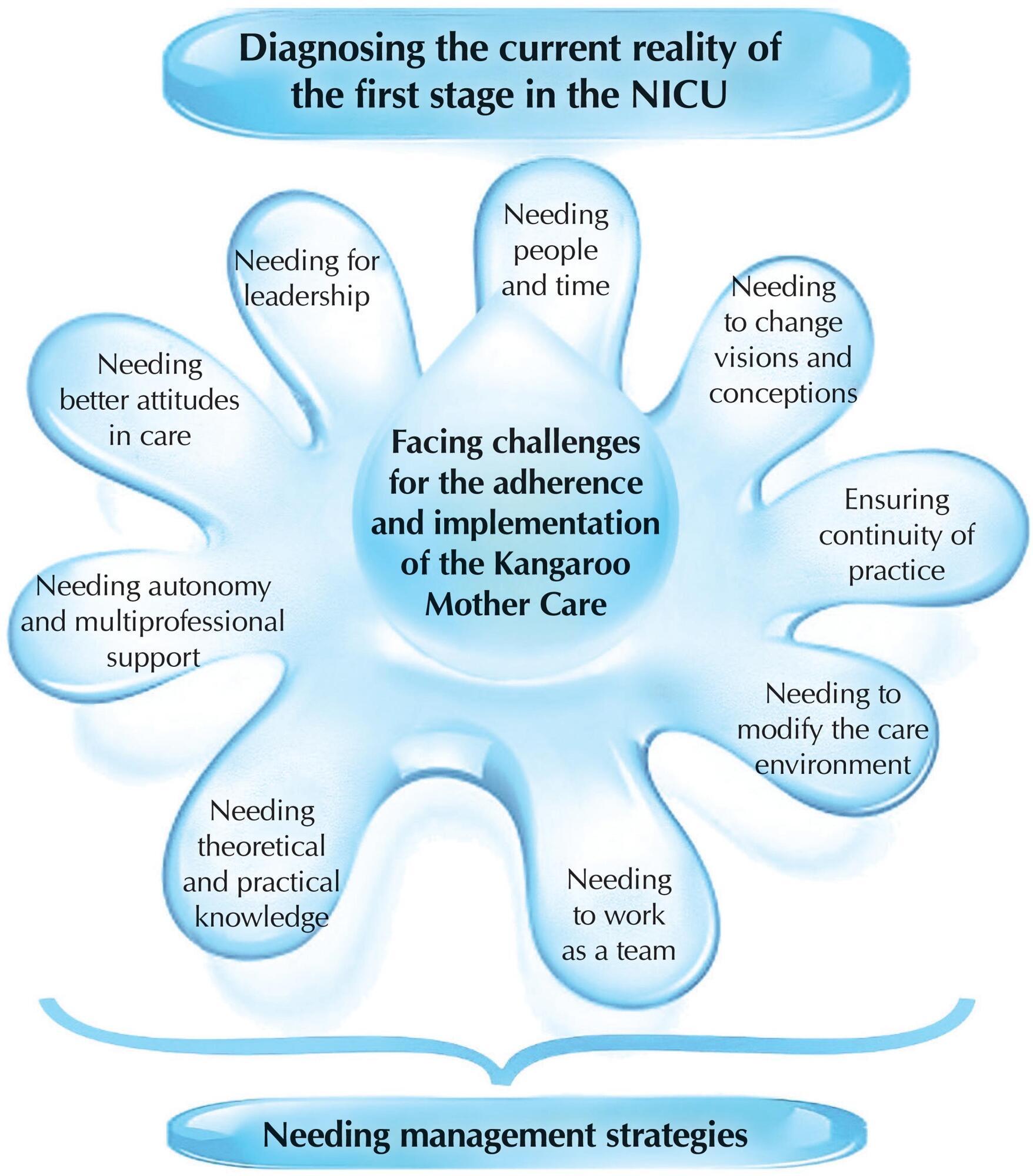-
RESEARCH
Management challenges for best practices of the Kangaroo Method in the Neonatal ICU
Revista Brasileira de Enfermagem. 2018;71(suppl 6):2783-2791
01-01-2018
Resumo
RESEARCHManagement challenges for best practices of the Kangaroo Method in the Neonatal ICU
Revista Brasileira de Enfermagem. 2018;71(suppl 6):2783-2791
01-01-2018DOI 10.1590/0034-7167-2018-0428
Visualizações0ABSTRACT
Objective:
To understand the conditions that influence the adherence and application of best practices by nurses in the context of the Nursing care management in the Kangaroo Mother Care in the Neonatal ICU.
Method:
Study of qualitative approach, whose theoretical and methodological frameworks were Symbolic Interactionism and Grounded Theory, respectively. We used the in-depth interview with 8 nurses from the Neonatal ICU of a public maternity hospital in the city of Rio de Janeiro.
Results:
The conditions involved in adhering to the best practices of humanization in the Neonatal ICU are related mainly to human resources, interaction among professionals, work processes and leadership strategies; and care management.
Conclusion:
Professional and institutional challenges have been identified that need to be addressed to improve adherence and implementation of the Kangaroo Mother Care best practices.
Palavras-chave: Health Services AdministrationInfant, PrematureIntensive Care UnitsKangaroo Mother CareNursingVer mais
-
RESEARCH
Hand hygiene management among nurses: collective health challenges
Revista Brasileira de Enfermagem. 2018;71(suppl 1):562-567
01-01-2018
Resumo
RESEARCHHand hygiene management among nurses: collective health challenges
Revista Brasileira de Enfermagem. 2018;71(suppl 1):562-567
01-01-2018DOI 10.1590/0034-7167-2017-0538
Visualizações0ABSTRACT
Objective:
To describe the determining factors in hand hygiene management among nurses and identify associated collective health challenges.
Method:
Cross-sectional descriptive study. Data were collected using a questionnaire that was applied in four internal medicine units of a hospital of reference in Portugal.
Results:
The sample was composed of 50 nurses aged 26 to 55 years (mean age of 34.88 years); 80% were women, 58% had a Bachelor’s degree, and had 5-30 years of nursing practice (X̄ =11.94;±5.92). The vast majority of nurses (90%) reported complying with the existing recommendations on hand hygiene in pre-established moments. However, none of the nurses were able to identify all the moments for hand hygiene using water and soap or alcohol-based handrub.
Conclusion:
This study shows that continuous training, adequate materials/structures in the units, and redesigned administration/supervision practices are determining factors to achieve higher levels of adherence to hand hygiene among nurses, as well as increased quality and safety in care delivery, which is a current collective health challenge.
Palavras-chave: Hand hygieneHealth Services AdministrationInfection ControlNursesPublic Health NursingVer mais -
PESQUISA
Knowledge management in Portuguese healthcare institutions
Revista Brasileira de Enfermagem. 2016;69(3):492-499
01-01-2016
Resumo
PESQUISAKnowledge management in Portuguese healthcare institutions
Revista Brasileira de Enfermagem. 2016;69(3):492-499
01-01-2016DOI 10.1590/0034-7167.2016690311i
Visualizações0Ver maisABSTRACT
Objective:
to evaluate the perception of healthcare institution collaborators in relation to knowledge management in the institution where they operate and analyze the existence of differences in this perception, based on the institution's management model.
Method:
a study conducted in a sample consisting of 671 collaborators from 10 Portuguese healthcare institutions with different models of management. In order to assess the knowledge management perception, we used a score designed from and based on items from the scores available in the literature.
Results:
the perception of moderate knowledge management on the healthcare institutions and the statistically significant differences in knowledge management perception were evidenced in each management model.
Conclusion:
management knowledge takes place in healthcare institutions, and the current management model determines the way staff at these institutions manage their knowledge.



